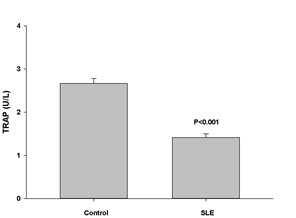Session Information
Date: Monday, November 9, 2015
Title: Systemic Lupus Erythematosus - Human Etiology and Pathogenesis Poster II
Session Type: ACR Poster Session B
Session Time: 9:00AM-11:00AM
Background/Purpose: Previous studies have shown that
patients with systemic lupus erythematosus (SLE) are prone to systemic osteoporosis,
bone loss and fracture. Paradoxically, previous studies have shown that
inflammation in these patients causes the inhibition of ostoclastogenesis. Recently,
serum antibodies to Malondialdehyde-Acetaldehyde (MAA) antibodies have be found
in SLE patients. However, their role in disease process has not be determined.
Therefore, it was the purpose of this study to explore the role of bone markers
in SLE and their interaction with antibodies to MAA modified proteins.
Methods: Eighty-eight SLE patients, all satisfying
ACR classification criteria, and 92 controls were examined. Serum antibody
levels were measured by enzyme-linked immunosorbent assay (ELISA) for levels of
IgG, IgA, and IgM anti-MAA antibodies specific to the MAA epitope, TRAP and BAP.
Pearson correlation coefficients were used to examine associations of bone
markers with MAA antibodies.
Results: Bone markers were assessed and revealed a
decrease in TRAP levels in the SLE cohort (1.41 U/L) as compared to the
controls (2.67 U/L) (P<0.001) (Figure 1). BAP levels remained unchanged
between the two groups. Bone markers were compared to serum IgA, IgG, and IgM
anti-MAA levels and showed associations with IgM anti-MAA levels and TRAP
(R=0.273, P<0.01). There were no associations with BAP demonstrated in the
study.
Conclusion: These data show that patients with SLE
have significantly lower TRAP levels as compared to controls. This decrease could
be related to the inhibition of osteoclastogenesis shown in other studies. In
addition, TRAP concentrations were associated with anti-MAA IgM levels consistent
with the increased inflammatory burden that characterizes SLE. These data may
be useful in helping predict disease status in patients with SLE. More work
needs to be done to determine other bone markers and their role in SLE.
To cite this abstract in AMA style:
Borghoff K, Hollins A, Duryee MJ, Mikuls TR, Zhang Z, Su K, Hearth-Holmes M, Thiele GM. Serum Tartrate Resistant Acid Phosphatase (TRAP) Levels Are Decreased and Associated with Anti-Maa Antibodies in Systemic Lupus Erythematosus (SLE) Patients [abstract]. Arthritis Rheumatol. 2015; 67 (suppl 10). https://acrabstracts.org/abstract/serum-tartrate-resistant-acid-phosphatase-trap-levels-are-decreased-and-associated-with-anti-maa-antibodies-in-systemic-lupus-erythematosus-sle-patients/. Accessed .« Back to 2015 ACR/ARHP Annual Meeting
ACR Meeting Abstracts - https://acrabstracts.org/abstract/serum-tartrate-resistant-acid-phosphatase-trap-levels-are-decreased-and-associated-with-anti-maa-antibodies-in-systemic-lupus-erythematosus-sle-patients/

